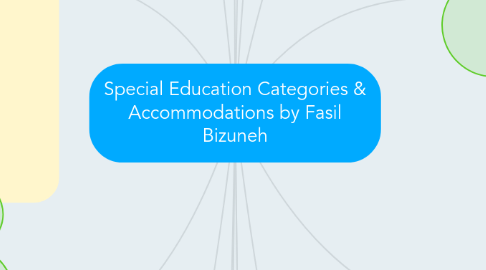
1. Visual Impairment Including Blindness
1.1. Even with correction still adversely affects child's educational performance
1.2. Parial sight
1.3. Blindness
1.4. Suggestion
1.4.1. Early intervention is paramount. Meet with an optometrist. Alter lesson plan to incorporate audio and sensory methods. Address specific learning requirements in IEP
2. Specific Learning Disability
2.1. adversely affects child's educational performance
2.2. Perceptual disablities
2.3. Minimal brain dysfunction
2.4. Dyslexia
2.5. Developmental aphasia
2.6. Case Study (Sara)
2.6.1. Had trouble learning to read. Was assessed to have a learning disability. Was assigned reading specialist & resource room teacher to meet with each day. Has now caught up to her grade's reading level.
2.7. Suggestion
2.7.1. Arrange for individualized instruction with professional to address specific needs
3. Orthopedic Impairment
3.1. adversely affects child's educational performance
3.2. Congenital abnormally
3.3. impairments caused by diesease
3.3.1. polio
3.3.2. bone tuerculosis
3.3.3. Scoliosis
3.3.3.1. Forrest Gump's character would have fallen into this category
3.4. impairmnets from other causes
3.4.1. cerebral palsy
3.4.2. amputations
3.4.3. fractures
3.5. Suggestion
3.5.1. Find out if child is restricted from certain physical activities or has pain when sitting for long periods of time. Make exception to address these issues.
4. Other Health Impairment
4.1. adversely affects child's educational performance
4.2. Limited physcical abilities
4.2.1. Strength
4.2.2. Vitality
4.2.3. alertness
4.3. caused by acute health problems
4.3.1. epilepsy
4.3.2. heart condition
4.3.3. Tourettes
4.3.4. leukemia
4.4. Suggestion
4.4.1. Work with doctors, school nurse & parents to make sure all health needs are addressed within the school day. Adjust IEP to accommodate specific issues.
5. Developmental Delay
5.1. Delay in physical development
5.2. Delay in cognitive development
5.3. delay in ability to communicate
5.4. Delay in social or emotional development
5.5. delay in adaptive behavioral development
5.6. Suggestion
5.6.1. Counseling & training for the family of student is often advised
6. Emotional Disturbance
6.1. An inability to learn that cannot be explained by intellectual, sensory, or health factors.
6.2. An inability to build or maintain satisfactory interpersonal relationships with peers and teachers.
6.3. A general pervasive mood of unhappiness or depression.
6.4. A tendency to develop physical symptoms or fears associated with personal or school problems.
6.5. adversely affects child's educational performance
6.6. Suggestion
6.6.1. For some students with emotional disturbance, symptoms can be stabilized over time using an approach that combines medication and psychosocial treatment.
7. Hearing Impairment
7.1. permanent or fluctuatiing loss of hearing
7.2. adversely affects child's educational performance
7.3. Suggestion
7.3.1. Child should meet with audiologist to determine specific needs, and fitted with hearing aides.
8. Speech or Language Impairment
8.1. Stuttering
8.1.1. Many people are able to overcome these speech impairments & lead rewarding lives
8.2. Impaired articulation
8.3. voice impairment
8.4. adversely affects child's educational performance
8.5. Suggestion
8.5.1. Assign one on one time with speech pathologist to address student's specific needs.
9. Multiple Disabilities
9.1. Child exhibits more than one the other 13 categories
9.2. Suggestion
9.2.1. Must diagnose which disabilities are involved, and then come up with a comprehensive IEP to address all of the student's specific needs
10. Autism
10.1. developmental disability significantly affecting verbal & nonverbal communication & social interaction
10.2. stereotyped movements
10.3. resistance to change
10.4. adversely affects child's educational performance
10.5. Suggestion
10.5.1. Sped programs for students with ASDs focus on improving communication, social, academic, behavioral, and daily living skills.
11. Intellectual Disability
11.1. adversely affects child's educational performance
11.2. Significantly subaverage general intellectual functioning, existing concurrently with deficits in adaptive behavior
11.3. Case Study (Matthew)
11.3.1. Has trouble learning new things. Parents & Sped teachers worked together to find out what Matthew can do for work. They helped him to explore careers relating to trees and the outdoors (his two main interests).
11.4. Suggestion
11.4.1. Develop an IEP to assess and meet the child's unique needs
12. Deafness
12.1. Hearing Impairment
12.2. Difficulty processing linguistic information
12.3. adversely affects child's educational performance
12.4. Case Study (Caroline)
12.4.1. She was fitted with hearing aides and regularly meets with speech pathologist to improve speech, vocabulary and attentiveness.
12.5. Suggestion
12.5.1. Teachers must work closely with audiologists to help student maximize their learning despite auditory impairment
13. Deaf-Blindness
13.1. Simultaneous hearing & visual impairments
13.2. Hellen Keller is perhaps the most famous person to overcome deaf-blindness
13.3. adversely affects child's educational performance
13.4. Suggestion
13.4.1. SPED & related services to address the individual needs. Often one on one attention is required
14. Traumatic Brain Injury
14.1. adversely affects child's educational performance
14.2. Acquired brain injury caused by external physical force,
14.3. Open or closed head injuries
14.4. affecting one or more areas
14.4.1. cognition
14.4.2. language memory
14.4.3. attention
14.4.4. reasoning
14.4.5. abstract thinking
14.4.6. judgement
14.4.7. speech
14.5. Suggestion
14.5.1. Plan ahead to address child's newly encountered challenges. Develop flexible IEP to address those needs. Set expectations on current, not past, abilities

